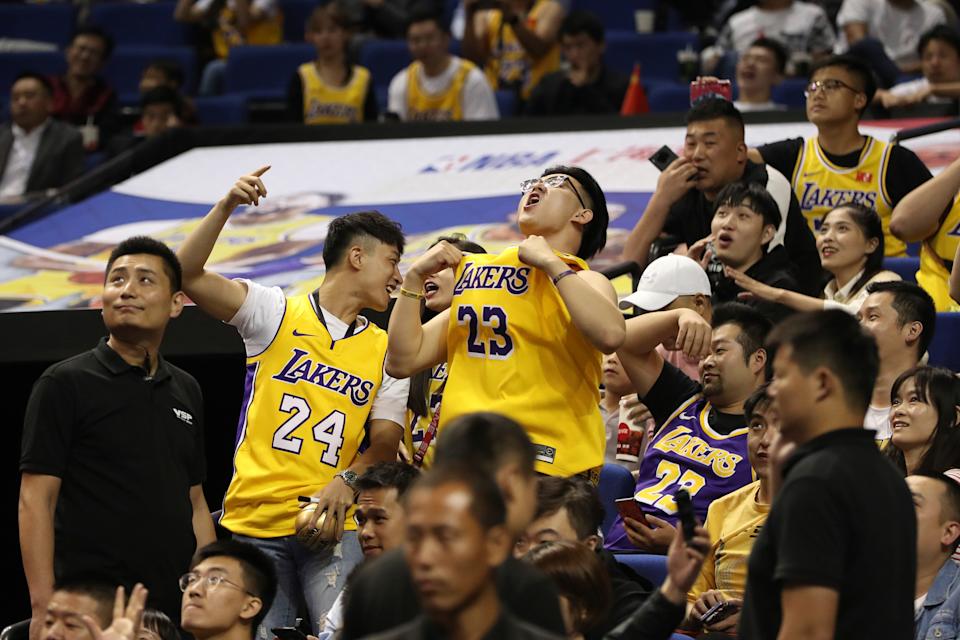China, NBA each want something — but without the complications
A few hours before the Los Angeles Lakers and Brooklyn Nets squared off in Shanghai, reporters found out the most highly anticipated moment of Thursday’s game wouldn’t occur. The NBA announced that media availability for both teams was canceled, meaning LeBron James’ deafening silence on Houston Rockets GM Daryl Morey’s seven-word tweet that incited an international incident would last, at the very least, another day.
Anything he would have said, even a tepid refusal to comment, would have spoken volumes. But it’s not like the man with his own media company and a combined 103 million followers on Instagram and Twitter needs the NBA’s microphone to speak his mind. Neither does any other star, for that matter, which begs the question:
What was the Chinese government, which has manhandled the NBA all week and forced everyone in the NBA — from Adam Silver to Steve Kerr to James Harden and Chris Paul — to either trip around Morey’s support for Hong Kong’s pro-democracy protests or apologize for it, so afraid of?
It’s not like the press conferences taking place in countries it can’t control have given the Communist Party of China much to worry about. A reporter in Japan, for example, was shut down by a Rockets spokesman for asking Harden and Russell Westbrook if they still felt comfortable voicing their opinions on controversial political issues. It’s not as though star players are leaping at the chance to fall on the sword for Morey. Even Harden, his own team’s star, whose signature Adidas shoe is popular in China, apologized to Chinese fans.

NBA commissioner Adam Silver’s scheduled press conference was canceled, too, as well as NBA Cares events that would have included the press. It’s also worth noting the cancellations came down after the press conference Silver gave in Japan on Tuesday was repudiated by CCTV, China’s state-run media channel, which insisted any challenge to Chinese sovereignty did not fall within the purview of free speech.
“It’s very easy to mobilize the entire population so it seems like there’s only one voice. Nobody’s going to take an opposition position to the Chinese Communist Party or the government,” said Stanley Rosen, a political science professor of Chinese politics and society at the University of Southern California.
If something as benign as a reference to the wider scope of freedom of expression in America is considered too incendiary by Chinese officials to be broadcast to its citizens — a statement that even an NBA player trying not to rock the boat could easily let slip in front of cameras — then we’re grading on a different curve. Just how much power would the NBA have if it didn’t cooperate with Chinese officials? How wise that approach would be while players, coaches and officials remain inside their borders is, however, an open question.
Is the Chinese government's approach paranoid? Yes. But paranoia is what keeps the authoritarian machine well-oiled.
More importantly, China exerts control over foreign businesses by being the communicative middleman between their 1.4 billion consumers and the products they want. It can use more draconian measures against domestic companies, but to control the behavior of the foreign companies it does business with, China desperately needs to control public opinion within its own borders, and to that end, it will take any measures necessary.
“China is much more concerned with influencing your behavior than being loved by you,” Rosen said. “They’re much more concerned with public opinion at home than what foreigners think. What they want is to get you not to do something you might normally do. For example, they want to create a situation where a general manager of an NBA team will not tweet support for Hong Kong. They’re basically saying if you do, there will be consequences. They will make you suffer, in the only way they can, which is economically.”
The government needs corporations to believe all 1.4 billion of its citizens are indeed unified — or that at least enough of them are under the thumb of the regime to be weaponized — and it needs to control the message its citizens receive. Despite the strength of its firewall, putting several foreign and domestic cameras in front of players liable to say anything in the midst of a news cycle nobody can ignore complicates that mission.
The Chinese Communist Party was guarding against a sound bite, even in the face of players and coaches who have evidently been reluctant to provide any.
On Thursday, China got the NBA product without any NBA complications. And the NBA wants Chinese fans without Chinese complications. Both sides fear each other. Both sides have leverage, but thus far, only China has used it.
More from Yahoo Sports:
